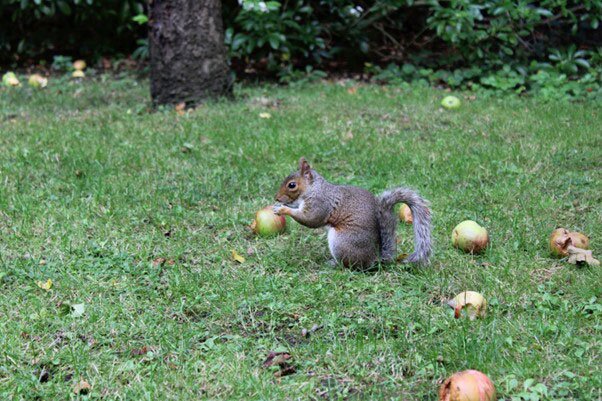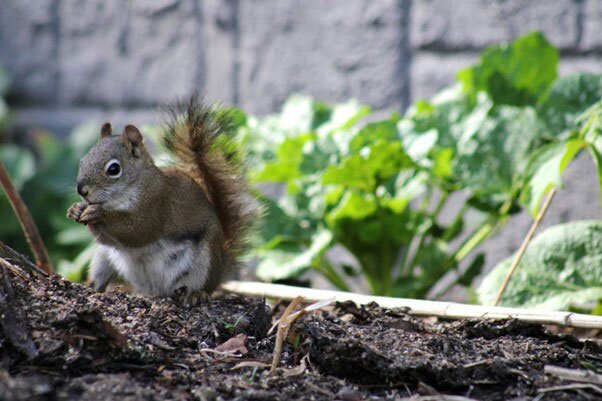Squirrels may look harmless, but they can quickly become a nuisance in your garden when they start digging up flowerbeds, snacking on bulbs, and stripping the bark from your carefully tended shrubs and trees. Their persistent foraging and digging habits can undermine your garden’s health and beauty, so it’s essential to take steps to deter squirrels before they cause significant damage.

Fortunately, there are many squirrel deterrent methods to help protect your garden that are cost-effective, easy to implement, and humane. In this guide, we’ll explore how to get rid of squirrels in your garden and prevent them from coming back, covering:
- Why do squirrels come into your garden?
- Signs you have squirrels in your garden
- How to get rid of squirrels in your garden
- How to get rid of grey squirrels
- How to deter squirrels
-How to stop squirrels digging up bulbs
-Protect trees and fruit-bearing plants
Why do squirrels come into your garden?
Squirrels are drawn to gardens for several reasons, and understanding why can help you decide how to deter squirrels effectively and stop them from causing damage to your plants and trees. Here are some of the primary factors that may be attracting squirrels to your garden:
- Food sources: Squirrels are opportunistic feeders, and your garden is the perfect place for them to forage for food. They’re particularly attracted to nuts, bulbs, and trees with exposed fruits or seeds.
- Shelter and nesting: Gardens with dense shrubs, trees, or secluded spaces like compost piles provide ideal nesting spots for squirrels.
- Water access: Squirrels need water, so if your garden has a pond, birdbath, or other water sources, it may attract them, particularly during dry periods.
Signs you have squirrels in your garden
If you’re noticing unexplained damage around the garden, squirrels could well be the cause. But before you start thinking about squirrel deterrents, you’ll want to determine whether squirrels are actually the culprits. Other common pests, such as cats, mice, and foxes can also wreak havoc in your hedges.
So, how do you know if squirrels are to blame? One of the most obvious signs is shallow digging in your flowerbeds or grass-covered areas, where squirrels often search for bulbs or bury food for later. They’re particularly fond of newly planted areas, making spring and autumn key times to watch for this behaviour.
Missing bulbs, nibbled shoots, or stripped bark on trees and shrubs are also strong indicators. Squirrels often peel bark to reach the softer layers beneath or to gather nesting material, which can weaken or even kill young plants over time. Scattered debris, like half-eaten fruit or snapped stems, may also point to squirrel activity.
How to get rid of squirrels in your garden
Currently, there are two species of squirrels in the UK: red and grey squirrels. Red squirrels are native to the UK and are a protected species under the Wildlife and Countryside Act 1981, meaning it is illegal to intentionally kill, injure, capture, or disturb a red squirrel, as well as to damage or disturb their nests.
If you live in an area where red squirrels are present, it's important to avoid any deterrents that might cause them harm. Instead, focus on non-invasive solutions, such as using protective barriers like wire mesh to shield plants, bulbs, and trees without disrupting the local ecosystem.
How to get rid of grey squirrels
Grey squirrels are classed as an invasive species in the UK and are not protected under wildlife law. While grey squirrels may be legally managed, it is against the law to release one back into the wild once it has been trapped. Because of this, trapping is generally discouraged unless carried out by a licensed professional. The most effective and humane option is to deter grey squirrels from entering your garden in the first place using preventative methods like wire mesh.
For more information on how to get rid of grey squirrels in your garden safely and legally, refer to the RSPCA’s advice.
How to deter squirrels
Now you know how to identify squirrel activity, it’s time to learn how to deter squirrels from your garden effectively. The good news is, there are simple steps you can take to make your lawn less inviting to these garden invaders, and greatly reduce the chances of them returning. From mesh barriers to scent-based squirrel repellents, the following methods can help you reclaim your garden.
Secure your garden
One of the most effective ways to deter squirrels is to physically block their access to vulnerable areas using wire mesh. Squirrels have sharp teeth, so it’s best to avoid a mesh that’s too thin that they could chew through. This squirrel protection mesh has a 16 gauge (1.6mm) wire, and 25 x 25mm holes that are small enough that squirrels can’t wiggle their way through. If you’re looking for the best squirrel repellent mesh that can also keep away birds, try stainless steel mesh with 13 x 13mm holes and a 16 gauge.
How to stop squirrels digging up bulbs
In areas of the lawn where bulbs are planted, lay your mesh flat against the ground, trimming as needed with suitable cutters, such as 200mm diagonal wire cutters. Then, secure the edges and corners using heavy duty ground pegs. Once the grass begins to grow through the mesh, it will become less visible while still acting as an efficient squirrel repellent.

To protect raised beds and flower beds, the process is the same, although you may want to choose a finer mesh to allow space for your emerging crop. Alternatively, you can fix mesh inside wooden frames using U-shaped galvanised staples, creating removable panels that can be lifted off when you’re tending to the plants. A heavy duty tacker is ideal for stapling wire that’s between 1.5–2.5mm in thickness.
To shield bulbs in pots, cut a piece of mesh slightly larger than the pot’s surface, and weigh it down with decorative stones or secure it with twine around the rim. As the shoots emerge, you can snip holes in the mesh or remove it entirely once the bulbs become more established.
Protect trees and fruit-bearing plants
To stop squirrels from gnawing on bark or climbing up trees, wrap the base of the trunk in a tree guard. You can also install a smooth, wide collar known as a baffle, which has a slippery surface that deters squirrels from climbing.
If squirrels are targeting fruit or nuts, you can create fruit cages from 13mm hole wire mesh. Keep the area around your trees tidy by regularly removing windfall fruit, acorns, or seeds. This reduces the incentive for squirrels to linger in your garden in the first place.
Use natural squirrel deterrents

While it’s illegal to harm red squirrels, there are plenty of humane and natural ways to discourage squirrels from taking over your garden.
- Grow squirrel-repelling plants: Some plants naturally deter squirrels. Daffodils are toxic to them and make a great natural barrier. Alliums (such as onions, garlic, and chives) as well as hyacinths are also known to put squirrels off. Try planting these around areas most at risk.
- Create textured mulch: Squirrels dislike digging through rough or sharp textures. Using crushed shells or coarse gravel in your flowerbed can help deter them from digging.
- Use citrus peels or peppermint oil: The strong scent of citrus is unpleasant to squirrels. Scatter orange or lemon peels where they’re most active. Peppermint oil on cotton wool balls placed in pots or borders can also help.
- Use coffee grounds: Used coffee grounds are a gentle deterrent with a strong smell that squirrels don’t like. They’ll also enrich your soil, making this a great two-in-one solution.
Scare them off
One of the simplest ways to get rid of squirrels in your garden is to scare them away. Squirrels are prey animals and naturally wary creatures, so they’ll typically steer clear of spaces where they perceive a potential threat.
Try setting up decoy predators like fake owls or hawks around your garden. Put them in visible, elevated positions like on fence posts or tree branches, and move them every few days so squirrels don’t become accustomed to them. Another visual deterrent that can be effective against both squirrels and birds is a scarecrow. Try attaching reflective tape, bells, or streamers to the arms or head so they move and make noise in the wind.
Beyond visual scare tactics, motion-activated devices that emit bursts of water or alarm sounds can be a great squirrel repellent, startling the animals without causing them harm.
Now that you know how to get rid of squirrels and prevent them from coming back, you can take confident steps to protect your garden from damage. Remember: prevention is always easier — and more cost-effective — than dealing with the aftermath, and the right squirrel protection mesh can make a big difference in keeping your outdoor space secure.
At Mesh Direct, we stock a wide range of wire mesh for all your pest control needs, from rabbit netting and mole-proof mesh to fox protection mesh, rat mesh, mouse mesh, and insect mesh. Whatever your garden layout, we’ve got the right solution to help keep pests out and peace of mind in.
Need help choosing the right option? Get in touch and a member of our team will be happy to help.
Why trust Mesh Direct?
Mesh Direct is a family-run UK specialist established in 1952, with decades of hands-on experience supplying wire mesh, wire netting, and fencing solutions. Our guidance is shaped by real-world use across domestic, trade, and industrial projects, helping customers choose materials that are fit for purpose and correctly specified.
As members of the British Stainless Steel Association and recipients of the Feefo Platinum Trusted Service Award, we provide transparent, expert guidance you can rely on. If you are unsure which mesh is right for your project, our team can offer practical, application-led advice. Contact us for guidance.
✅ Secure online checkout
✅ Fast UK delivery from stock
✅ Clear returns policy
✅ Trade & DIY support
✅ Trusted customer reviews





